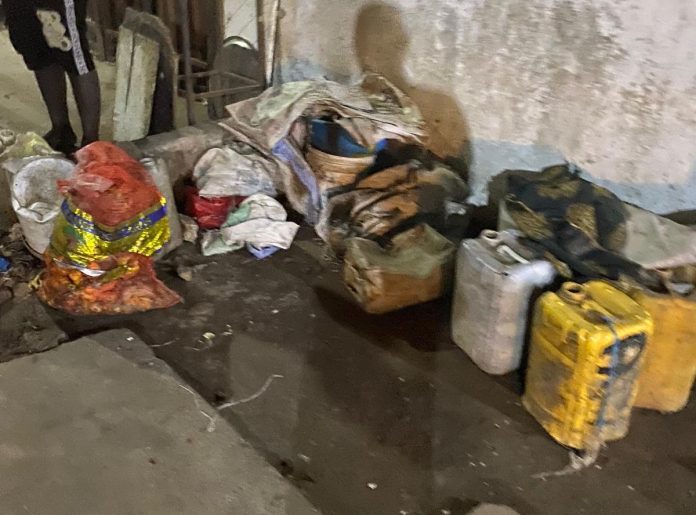By Ida. J. Sallah
RESPONSIVENESS IS KEY TO QUALITY LEADERSHIP
(Chaos in Jobe Street and Sandika Vicinities)
Leadership quality could be assessed based on the degree of its responsiveness to the electorate’s concerns. The tabled subject matter in this write-up is not news to many Gambian citizens, both inside the country and the diaspora. As mentioned by the Member of Parliament for Serekunda, Honourable Musa Cham during parliamentary sittings, Honourable Halifa Sallah during the 2024 National dialogue, Honourable Bala Jahumpa in a WhatsApp audio, the numerous publications in Foroyaa Editorial and Question of the Day, many concerned Gambians and foreign visitors, the chaos in Jobe street, from the Sandiga to Baboun Fatty Junction depicts social disorder, anarchy and negligence. The prevailing situation is the least expected in an area such as SerreKunda, the second town of the whole nation, whose environment should have been well planned, built, organised, and decorated to be attractive not only for citizens’ pride but also for touristic advocacy. As early as 4.00 am, one hears and sees vendors alighting from vehicles with their merchandise to occupy the street. Around 6.00 am to 7.00 am, the whole street is fully blocked with vendors and customers and wheelbarrows floating all over the place without any guidance and sometimes causing damage to vehicles and individuals.
The chaotic nature of the situation has become a big nightmare for people compelled to use the street, especially private and commercial vehicles and individuals going about their daily activities. They spend time before coming out of the ordeal and reaching the end junction, causing lateness in their workplaces or daily activities, leading to inefficiency in their work delivery, whether for personal or public interest.
Ambulances and Fire service vehicles coming in and out of the area to save lives and properties find it extremely difficult to get an easy ride. Sometimes, sadly enough, pregnant women do deliver their babies in taxis because of the blockage of the road.
Compound owners regularly paying their dues and bound to enjoy their rights, are also finding it very difficult to come out of their homes for their daily businesses or activities. They have become prisoners in their homes, resulting in disenchantment and frustration. Visitors to these homes, particularly those with vehicles, are deeply affected and thus disgruntled due to difficulty in driving into compounds or finding parking places near the gates of their hosts. The eyesores in the area, due to dirt and litter and the odour from rotten fish and vegetables, are quite unbearable.
Shopkeepers in their full legal gear are no exception to being tormented. They are also counted among the most disfavoured as they encounter unbearable hindrances not only in selling their goods as expected, but also customers having difficulties in getting access to their shops. Informal vendors block the doorsteps of their shops to the extent of deterring them from making enough sales to cover their operational costs, much more making a reasonable profit to ensure the continuity and sustainability of their businesses. This anarchy has also plunged them into despair, disenchantment and frustration. The continuous nurturing of such could lead to tensions between shopkeepers and informal vendors, unrest and instability. The crisis during the 2025 Tobaski Sales at the Serrekunda market is a clear testimony and a bitter and undesirable experience for both Gambian and Senegalese nationals bound to live as one people. It is also a bitter lesson for KMC as it exhibited its shortcomings in organising and maintaining an orderly, peaceful and law-abiding business community. The consequences of a generalised situation could be quite detrimental to many. It is a known fact that lack of adequate sales would eventually lead to losses, hence, to bankruptcy. The collapse of businesses would economically be counterproductive particularly in a tax-based economy heavily relying on levies, duties and taxes mostly drawn from businesses. Even in cases where business owners succeed in maximising or getting reasonable profits, consumers would obviously be the ultimate losers. They would bear the burden as the sale unit price always includes all costs incurred and the margin to maintain businesses, hence leading to low purchasing power, hardship and poverty.
This situation has persisted for a long period of time, and no permanent solution has been found. What one sees and witnesses is KMC collecting duties from vendors and from time to time, municipal and national police and army stepping in to chase them away. Vendors run helter-skelter to save their businesses during raids for one to three days and then return to the same spots, after losing a lot. The excuse one usually gets from authorities is that there are enough places in the market. If so, then why are the vendors still in the street? This excuse seems no longer tenable. The principle should have been No duty without appropriate and adequate marketplaces and amenities.
The irony is that, after all these raids, one can see KMC officers coming back and continuing to collect duties and even legitimatising the situation by trying to settle disputes among vendors over their sitting arrangements. Hence, one must ask the following questions: Do these officers understand their role? Have they been well-trained or received any induction course on the Local Government Act before their deployment? Has the leadership really understood the role of Local Government in National Development before standing for elections? Does it fully apprehend the essence of decentralisation, democracy and representation in a republic? Does it really understand the quintessence of delegating one’s trust and confidence to a leadership for one’s welfare and peace? With regards to the persistent sitting of vendors in the street, has KMC carried out thorough investigative research to understand the real facts and factors of the matter? In clearing their previous sitting place, combined with the building of new modern shops, has KMC taught about finding other marketplaces to accommodate those without a place? Has it aligned this move with strategic preventive fences and guards to ensure that the situation will not be transferred to other areas, and encroachment, disorder or chaos does not occur in Jobe street, the Sandiga/Clinic vicinity or any other street or road? Should it limit itself to such an excuse and leave some people to continue to violate laws and legal principles and procedures, and others take the law into their hands and resort to violence, insults and injuries to solve their problems? Should it allow the business community to be transformed into a jungle where might, misbehaviour, violation of prescribed laws and principles, disorder and chaos predominate and frustration, animosity and violence become the order of the day? What about its mandated role of establishing markets and maintaining municipal police to ensure public order? Is it appropriately collaborating with Central Government institutions to substantiate its efforts and put a definitive end to this chaotic situation rather than continuing to engage in these inconsistent exercises with street vendors?
KMC is not expected to wear the ombudsman cap but rather that of a good planner, strategist, builder, organiser and provider of appropriate services in a bid to ensure a clean and conducive business environment and a successful, peaceful, orderly and law-abiding business community.
The drainage system has also been a major cause for concern, especially during the rainy season when homes are heavily flooded. Drains are mostly uncovered, full of sand and garbage and not regularly emptied and thus blocking the flow of water. Consequently, one could evidently see, the raining water well littered with market garbage, covering home yards, causing unhealthy conditions to inhabitants. Even when drains are cleared, sometimes, the litter or garbage is left outside for days before being collected, rendering the service provided null and destructive. Therefore, for the satisfaction of its inhabitants, KMC should collaborate with institutions responsible for drainage and enforcement of anti-litter laws to ensure that work is not only done but also seen to be done up to expectations.
Local Government leaders should not only be abreast with the dictates of the Local Government Act but also abide by them in fulfilment of their electoral promises. They should make sure that the Central Government’s contribution to local development and collection of taxes, duties and levies from people serve their purposes. As mandated by the governing Act, they should ensure that Councils facilities and institutions such as police, markets, car parks, recreational parks or centres, gardens, cemeteries, low scale roads, clinics or mini hospitals, are not only well established and maintained but well demarcated to ensure easy access or ride for people to go about their businesses without hindrances. They should make sure that streets and their corners are not transformed into informal or unauthorised markets and car parks. It is common sense that roads are meant for vehicles passage and not anything susceptible of creating blockages and delays for the innocent going about their daily business. The right or expectation of voters or citizens is also to see that each of these above-mentioned institutions is well or appropriately established for their conducive living conditions and welfare.
Furthermore, a sense of unalloyed devotion to national interest and duty should help them closely work with central government to achieve their common goals rather than being retarded by political differences. Councils should be able to collaborate with the Central Government by relying on joint initiatives and capacity to address challenges instead of pointing fingers or engaging in a blame game as excuses to justify deviation from or failure to accomplish their duly assigned responsibilities. Councils should not, for fear of losing their support base, deliberately ignore and close their eyes to what is in the national and community interest in gross violation of laws and best practice, just to surrender to the unreasonable whims and caprices of their supporters. They should use means within their jurisdictions and prerogatives to honestly and truly address problems for a sustainable order to prevail. In short, they are expected to fully understand that the collection of duties from vendors goes hand in hand with appropriate and adequate provision of marketplaces, amenities and other social services. In other terms, they should be fully conscious of the fact that revenue and funds of a Council shall be applied to the administration, development and welfare of the inhabitants within its Area of jurisdiction (Gambia 2002 Local Government Act, Section 128 (2)).Anything other than this is tantamount to misrepresentation or exploitation of the electorate. The way Council leaders enjoy privileges and rights in their homes and beautiful offices through the trust and confidence vested in them by duty is the same way they should fully understand that the latter deserve better than these horrible and anarchical conditions. Based on the Supreme Law of the land and the Local Government Act as guiding documents, they are trustees who should appropriately and adequately measure up to expectations and hence, should not fall short in the execution of their mandated responsibilities.
Also, having sustainable development of the nation as their common denominator, Central Government should not be motivated by political differences to observe Councils succumb to failure just to build up its political support base. Its sense of duty should be its motivating and guiding force to support Councils in a bid to prevent loopholes in the performance of their various assigned constitutional responsibilities, no matter what future elections hold for it. In clear terms, the Central Government is expected to collaborate with Councils to ensure that their constitutional responsibilities towards the electorate are executed in accordance with prescribed guiding laws, principles and good practice. Central Government is duty-bound to ensure that the annual budgetary allocation to Councils is timely provided to them to efficiently carry out their Council responsibilities as enshrined in Section 128 (3) of the 2002 Local Government Act: Central Government shall provide twenty-five per cent of the Council’s development budget.
As development goes with unpopular measures for the unjust, selfish and dishonest people, leadership as well goes with a heavy price. He/she who yearns for it should be fully ready to bear the brunt. To elude the heaviness of the price, there is a need to put in place strategic preventive measures to avoid any conflicting situation with undesirable consequences that may, in one way or the other, be very expensive. Leaders should be well prepared for measures that may not be popular among the electorate, but equally, be assured that they would be considered proper in the eyes of the just, selfless and honest citizens, as constitutionally valuable for the collective interest. The preventive measures to mitigate lapses in the performance of Councils’ duties could be, among others, as follows:
- Councils should take their responsibilities to address problems rather than dodging and resorting to untenable excuses just to please voters for political motives. As collective interest predominates, when the need arises, they should work with the Central Government to prevent or solve problems without delay or procrastination.
- Central Government should also collaborate with Councils by creating a supportive body to help them execute their terms of reference without any discrepancy or failure, instead of waiting till the end of operations to look into the administrative and managerial loopholes which collaborative preventive measures could have addressed;
- Adequate and well-organised marketplaces should be provided and proportionally and rationally distributed. Catchment areas should be well identified, supervised and monitored to avoid congestion, encroachment and violation of set rules and procedures;
- These vendors occupying the street and road, especially women and mostly breadwinners, need to be provided with fixed and appropriate places with amenities (toilets, water, etc.) before collecting duties from them. This would enable them to safely and comfortably sell their goods without problems.
- Vendors, particularly women, should be well guided to understand and respect the boundaries of their rights and obligations or abide by the rule of law in a bid to successfully and peacefully carry out their businesses rather than being left to violate each other’s constitutional rights and freedoms to the extent of creating disenchantment, frustration, animosity and violence. To that effect, a team or committee should be put in place and provided with adequate resources to carry out effective sensitisation on market rules and procedures to create greater awareness on the extent and limits of vendors’ rights and freedoms. Each vendor should remain at the place where he/she has been allocated. Any violation of such should be timely, adequately and appropriately addressed;
- Shopkeepers’ businesses should be protected to deter any illegal sitting and blockage by informal vendors at their doorsteps;
- Special, adequate and appropriate areas should be identified to accommodate big event sales (commonly known as Wanterr)during Christmas, Easter, and Koriteh and Tobaski preparations before selling places or giving a license to vendors. This would help avoid frustration of shopkeepers and clashes, and violence among vendors and other stakeholders.
- Councils’ officers should be well-trained before being deployed on the ground, offered continuous professional development and provided with adequate resources to better enhance their capacities for quality service delivery;
- Law enforcement officers of the Councils should be stationed near markets and Councils’ facilities to prevent market vendors from leaving their allocated facilities.
- More Central Government law enforcement officers should be deployed and provided with sheltered stations to monitor streets to prevent any public disorder or illegal occupation of streets or roads.
- Community policing should be expanded with appropriate and adequate resources (patrol vehicles and/or motorcycles with enough petrol, and other necessary materialsand gadgets, etc.)to ensure effectiveness and efficiency in the discharge of their law and orderenforcement duties to elude any repeated scenarios such as road and street blockages and any other violations or challenges;
- Primary and secondary roads and streets should be well monitored and controlled to ensure that ambulances and fire service vehicles get easy access and ride to timely save lives and properties as expected or required;
- All vendors, particularly women, should be registered and a database accordingly, be created, kept and updated for any eventual allocation of stalls or shops, regularisation, monitoring and evaluation purposes in order to remedy shortcomings and improve services;
- In collaboration with designated State institutions, Councils should ensure that all drains are properly cleaned and garbage timely collected before the onset of the rains.




















